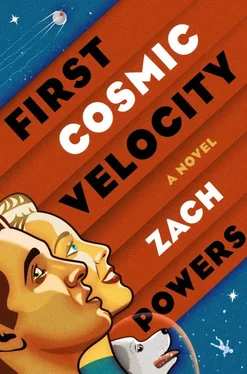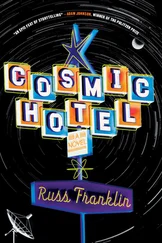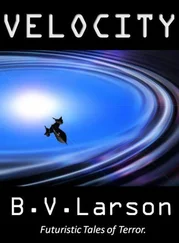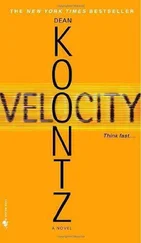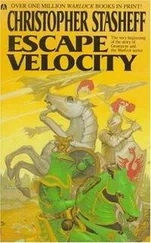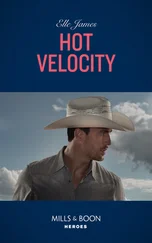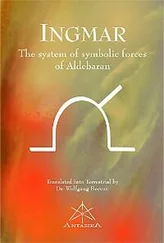“So I did,” said Tsiolkovski. “What about tea?”
“There’s a cup right in front of you,” said Varvara.
He patted at the table until his hand found it. He snaked one knuckly finger through the handle and held the cup in front of him without drinking from it. A picture of Nadya was printed on the side. With his other hand, Tsiolkovski returned the hollow horn to his ear.
“Is your brother with you?” asked Tsiolkovski.
“He’s gone. Dead.” The bitter taste returned to Leonid’s mouth.
“Nonsense.”
“He went to space.”
“I know that, of course.”
“He died there.” Leonid’s voice cracked.
“Nonsense. I spoke to him just yesterday.” Tsiolkovski gestured to the far corner of the cottage with the teacup, sloshing tea over his hand and onto the table.
In the corner, an old radio, components stacked a meter high, dominated the space that had once contained Grandmother’s dresser. The shiny metal surfaces, silver knobs, and glass-covered meters looked entirely out of place. Like Sputnik in a medieval painting. Like Leonid felt now sitting in his own home.
“I believe you’re mistaken,” said Nadya.
“Where’s my tea?” asked Tsiolkovski.
“In your hand,” said Varvara.
“You’re mistaken,” repeated Nadya.
“Who’s that?” asked Tsiolkovski.
“Our guests were just leaving.”
“Good riddance. You tell those inbred villagers to stay away from me. God knows what germs they carry.”
“I’ll tell them.”
Varvara led Nadya and Leonid from the table and outside. Leonid looked back. He had a view of the radio through the crack in the door until it closed completely.
“I apologize for my husband,” said Varvara.
Looking at her, Leonid saw that she was much younger than Tsiolkovski, maybe by decades. How could she tolerate sharing space with the man’s ramblings? He remembered the patience of Grandmother, the wisdom that led villagers to seek her out when they needed advice.
“He must be old now,” said Leonid. He prodded a mound of black dirt with his foot, uncovering the wet muck underneath.
“One hundred and eight. I think there’s something about this cottage that lends the men who live here long life.”
“It didn’t work for my brother.”
“You really don’t know?”
“Know what?”
“Your brother’s alive. Even now, he orbits the planet. My husband might be senile, but he’s not wrong about that. I’ve listened to their conversations. Every few days, my husband turns on the radio and speaks to him.” She pointed up at the trees. “There’s an antenna run throughout the woods, and a transmitter farther along. I wasn’t convinced that it was really Leonid he was talking to, not until now. You and your brother have the same voice.”
Mykola and Kasha were up the hill, playing together as if the years had not passed, as if Mykola were still a child and this Kasha were her mother. But back then, they did not play together like this. Mykola had been too fatigued by hunger. He played now the way he probably wished he could have played as a child, reclaiming some missed part of his youth.
“That’s impossible.” Sweat slicked Leonid’s palms. His mind raced through all the statistics he knew of Vostok. The exact numbers escaped him, but the amount of air in the tanks was measured in days, not months. Water would have lasted a week, and food less than that, even if his brother rationed it.
“There must be some mistake,” said Nadya. “They’re all dead. Every one of them.” She placed her hand on Leonid’s shoulder and squeezed so hard it hurt.
“All but one, it seems,” said Varvara.
Leonid backed one step at a time from the cottage, pulling free of Nadya’s grip. The land sloped away, threatening to topple him. He had not openly grieved his brother, but now realized that he had processed through grief the same as anyone. Maybe it was that the news came in this place, his and his brother’s home. He had come here perhaps for closure, but instead found the feeble sutures that held the wound shut ripped open to reveal his fresh red interior. He tried to speak, but he was panting.
“You two, the Leonids,” said Varvara, “it’s not surprising that one of you would survive against the odds. You survived this place, the famine and the purges. Konstantin, he wanted you to go first, but the Chief Designer saved you until the end. I think the Chief Designer knew that with time his capsule would improve, and combined with your perseverance, one of you would have the best chance to make it through the harsh reality of space. He held off on his best chance of success, denying himself heaven until he knew he had equipment worthy of his conqueror. But it never was worthy, was it? Or was it that we were not worthy to go there? At least not to go there and return.”
It was all too much. Leonid planted his feet and balled his fists. “There’s no such place as heaven. My brother escaped the hell of this valley only to be sent somewhere worse. Now you tell me he’s alive, when that clearly can’t be true. To hell with your husband, and with you, too, for playing along. Though I suppose you’re already there.”
Leonid spun and walked straight toward the woods that separated the cottage from the village. He wanted to disappear there among the trees. He wanted the fir needles to wrap him like a blanket. He wanted to sink into the earth, deeper and deeper until the liquid rock below boiled him. He was sick of the metaphors of heaven and hell, and wanted to know one of them for real. One piece of reality, that was all he wanted. One thing that was not a trick or a lie. He felt he had deceived even himself by believing that there was something in the valley waiting for him. Instead, he had found only the bastard who had begun all the lies in the first place. Goddamned Tsiolkovski.
Kasha barked. She had left Mykola on the hill and was scratching at the door of the cottage, leaving bright gashes like shooting stars on the gray surface of the wood.
“She hears him,” said Varvara.
“Tsiolkovski?” asked Nadya.
“It’s about the right time.” She spoke to Leonid’s back. “Konstantin must have turned on the radio. He speaks to your brother even now.”
She opened the door, and Kasha flashed through the crack and inside. Nadya and Varvara followed. Leonid hesitated.
Nadya stopped at the doorway and walked back to Leonid. “Are you coming?”
“I won’t let myself fall for another lie.”
“What is a lie, Leonid? Mere words. It’s even less than words, because they’re words with nothing behind them. I’m willing to risk that this is a lie for any small chance that it might be the truth.
“I think that’s what you never understood. Risk. Not you, not the Chief Designer, not the other twins, not even Ignatius. You all believe I regret that my sister died in my place. I do, of course. I’m not heartless. But I carry a grudge against her, too. I should have been the first person in space. Whatever small chance there was that someone would survive the trip, that chance was mine. Don’t you sometimes feel the same thing for your brother?”
Her eyes, usually set and cold, softened in the corners. The line of her lips turned up, however slightly.
“But it’s more than that,” she said. “Following you here, seeing you in this place, it’s helped me realize something about myself. It wasn’t traveling in space that was stolen from me, it was the return. An orbit is a perfect journey. From the moment of the launch, an orbit is designed to bring you home at the end. I’m not sure I’ll ever know where home is unless I close the circle. I’ll just continue on in a straight line forever, drawing farther and farther away from those few people I care about.”
Читать дальше
